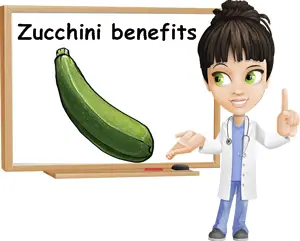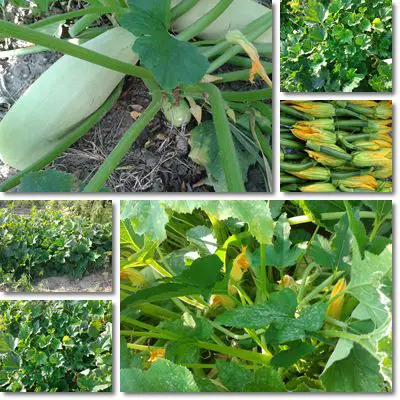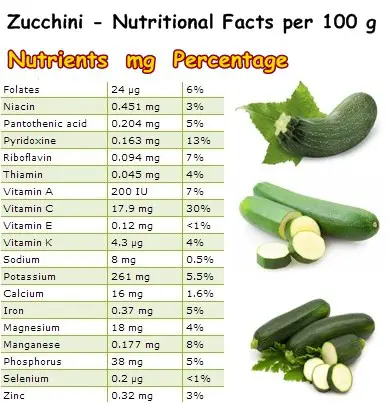Courgette or zucchini is a delicious summer vegetable from the Curcubita pepo species. It has an elongated oval shape and may vary in colour from light to dark green, sometimes with yellow stripes. There is also a yellow variety known as the golden zucchini. Zucchini is basically an unripe squash, preferred for its tenderness and delicate flavor.
It can grow to incredible lengths for a vegetable, reaching approximately one meter in length. However, it is recommended to harvest them at significantly smaller sizes because the smaller the zucchini, the more tender it is.
From a culinary point of view, zucchinis can be used in a variety of ways: sauteed, grilled, fried, made it into soup or just baked (this works best with the fully ripe varieties). Low in calories and with a high water content, they are a great food for achieving healthy weight loss.
The vegetable is a good source of potassium for good blood pressure and overall good cardiovascular health, vitamin A for vision and immunity, B vitamins, iron, manganese and phosphorus for a good energy metabolism, brain and nervous system health, anemia management, antioxidant protection and strong bones and teeth.

Zucchini is a wonderfully versatile culinary vegetable that you can easily turn into bread, schnitzel and even pancakes. And the best part is that it is full of vitamins and dietary minerals. You can easily grow your own in your home garden and once the seeds have been planted, it takes roughly 40-50 days until the first vegetables are ready to be harvested.
If you want to grow your own zucchinis, you will have to make sure you have enough garden space available because this vegetable has a rich foliage that may take up a lot of your garden space.
But it’s worth it because zucchini is a vegetable that does wonders for your figure. With only 17 kcal/100 g, it can easily help you keep your weight under control. Because no matter the dish it is added to, its low calorie content makes it a better ingredient than many others, ideal for reducing the total calorie value so many foods. Zucchinis don’t have any cholesterol and almost no fats, including saturated fats. Actually, 100 g of the raw vegetable has only 0.32 g of fat, further making it a great food for losing weight in a healthy way.
The peel is rich in dietary fiber, indigestible plant material that passes unchanged through the digestive tract. What makes dietary fiber healthy is the benefits it provides for the digestive, cardiovascular and immune systems. For example, a decent intake of dietary fiber helps prevent constipation by adding bulk to stools and regulating transit time, helping form soft stools that are easy to pass. This further engenders benefits for hemorrhoids. Soluble fiber also has mild prebiotic effects, meaning it ferments and feeds good gut bacteria.

The prebiotic properties of the fiber in zucchini are believed to offer a certain level of protection against oxidative stress and reduce the risk of colon cancer, for example. Indeed, zucchini have a moderate dietary fiber content: 1.1 g of fiber/100 g of zucchini, the majority of which is located in the skin. But even so, they provide cardiovascular benefits too because fiber reduces the absorption of fats from food at the intestinal level and indirectly lowers LDL and total cholesterol.
Moreover, some elements in zucchini called plant sterols actually compete with the absorption of cholesterol in the blood because they are so similar to it, but healthier. T
his also contributes to lower cholesterol levels and cardiovascular health. According to the European Food Safety Authority (Blood cholesterol reduction health claims on phytosterols can now be judged against EFSA new scientific advice), 1.5 to 2.4 g of plant sterols a day for 2-3 weeks can reduce blood cholesterol by 7 to 10.5%.
In addition to helping relieve constipation, improve hemorrhoids and contributing to cardiovascular health, zucchinis with their moderate fiber content are also good to eat if your have gastritis.
Typically, high amounts of fiber upset the stomach lining and worsen gastritis symptoms, but foods with a moderate content like zucchinis are actually good to eat for gastritis in limited amounts.
Because they are 90% water and a good source of dietary minerals, zucchinis help us stay hydrated during hot summer days.
While excessive sweating is normal when temperatures are high, it leads to dehydration and vitamin and mineral deficiencies.
So dehydration is dangerous not only because we lose water needed in order for our body to work properly, but also because we lose important minerals and this may lead to serious deficiencies that may have unpleasant consequences on our health.
Both the water loss and nutritional deficiencies need to be reversed in order to keep being healthy and energized. And drinking liquids is not the only way to keep hydrated; you can also eat foods that have a high content of water and further provide essential nutrients, such as zucchinis, cucumbers, tomatoes or watermelon. And you don’t even have to cook zucchinis: cut them in small cubes or thin slices, season them to your liking, add some extravirgin olive oil, maybe add other vegetables you like and you may enjoy a refreshing, rehydrating summer salad.

Above, you can see the nutritional value for 100 g of raw zucchini. The vegetable contains small amounts of antioxidants with vitamin A activity, essential for good vision and beautiful skin. Vitamin A, together with vitamin C, have anti-inflammatory properties and strengthen the immune system. 100 g of fresh zucchini provides 30% of the RDI of vitamin C. However, remember vitamin C is sensitive to heat, so any form of cooking can destroy it completely. The vegetable also contains B group vitamins such as thiamine, pyridoxine, folic acid and riboflavin, key-elements essential for a variety of cellular processes and minerals such as iron, manganese, phosphorus and zinc, the latter being crucial for good immunity.
What are the benefits of Zucchini?
- Constipation relief and better intestinal transit.
- Has prebiotic effects, good for digestion and colon health.
- Low in calories and fat, good source of fiber for weight loss.
- Helps lower LDL (bad) cholesterol and even total cholesterol levels.
- Safe to eat if your have gastritis, but in limited amounts and cooked, not raw.
- Hydrating and tonic effects thanks to its water and nutritional content.
- Source of B vitamins for brain and nervous system health.
- Benefits for energy metabolism, good for muscle weakness.
- Has folic acid which is good for pregnant women.
- Contributes to beautiful skin and hair.
- Contains phosphorus for strong bones and potassium for good blood pressure.
- Source of small amounts of iron for for anemia management and vitamin A for good vision.
- Contains antioxidants such as vitamins A and C and manganese.
- Also good for the immune system.
Golden zucchinis are rich in flavonoids such as beta-carotene, lutein and zeaxanthin (flavonoids are natural antioxidants). These variety has higher levels of antioxidants compared to the more common green zucchini which relies more on antioxidant vitamins and minerals rather than flavonoids, carotenoids and other polyphenols.
Conclusion
All in all, the vegetable is great in a variety of dishes, from zucchini soup and zucchini bread to stuffed zucchini, ratatouille or zucchini pancakes. Even the flowers are edible and good tasting, either stuffed with vegetables, rice or minced meat or fried. Finally, in order to be an absolute expert on zucchinis, you can amaze everyone by telling them this: though zucchini is considered to be a culinary vegetable, it is actually a fruit.
